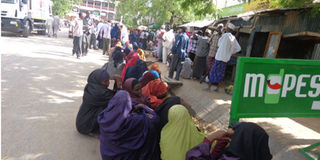Man, 70, dies in Garissa as he waits for State cash

Elderly men and women from different sub-counties in Garissa County queue to receive their welfare cash at the KCB Garissa branch, May 26, 2015. PHOTO | ABDIMALIK HAJIR | NATION MEDIA GROUP
What you need to know:
- Mr Hassan said the old man was shocked when he reached at the cashier, only to be told that his name was missing among the beneficiaries of the cash transfer programme.
He noted that his father had taken Sh2,000 loan from a trader, with a promise that he would refund the amount once he collected the stipend from the bank.
Some elderly men returned dejected after the system failed to recognise their fingerprints, leaving with them the extra burden of repaying debts incurred for travelling to Garissa.
A 70-year-old man collapsed and later died of fatigue after queuing for two consecutive days in the sun waiting to receive his share of State welfare cash from a bank in Garissa Town.
Hassan Hajji Keinan, who suffered hypertension and was physically challenged, had travelled 274 kilometres to claim his Sh8,000 stipend, according to family members.
The elderly man had travelled from Mataarba village in Sangailu, Hulugho Sub-County to Garissa Town to get the cumulative amount which had accrued for four months.
The Sh2,000 monthly stipend to vulnerable people, previously channelled through decentralised postal offices, was moved to the Kenya Commercial Bank in Garissa Town.
This has forced thousands of elderly, orphans and disabled person to travel from all seven sub-counties and converge at the bank, which has few branches in the vast north-eastern region.
Mr Guhad Hassan, the eldest son of the deceased, said his father complained of rapid heartbeat while on the queue and then started sweating profusely.
Mr Hassan said the old man was shocked when he reached at the cashier, only to be told that his name was missing among the beneficiaries of the cash transfer programme.
“He started profusely sweating, before he collapsed some metres from the bank and later died while undergoing treatment at a private hospital”, Mr Hassan told journalists.
TAKEN A LOAN
Mr Hassan noted that his father had taken Sh2,000 credit from a trader, with a promise that he would refund the amount once he collected the stipend from the bank.
At the Kenya Commercial Bank’s Garissa branch, there was a long queue of elders waiting for their turn to be given their cash.
Mr Abass Hajji Shurie, the chairperson of Hullugho/Ijara disabled people’s association, faulted the government for “punishing the beneficiaries” of the social welfare fund by forcing them to travel to Garissa to get their money from a single financial institution.
“Initially we had no problem of getting our money since it was coming through our respective postal offices.
“But now we were required to travel from all corners of the county to KCB Garissa branch. We wonder on whose interest the disbursement of money was reduced to one bank”, he said, while being assisted on his wheelchair.
He explained that he had spent 2,000 from Masalani to Garissa and had been forced to hire a person to push him from the lodge where he was staying to the bank for three days as he waited for his Sh8,000 accumulated amount.
FORGO THE MONEY
He said many elders and disabled people from far-flung areas had opted to forgo the money because they couldn’t get the fare to travel to Garissa.
The government sets aside billions of shillings in a cash-transfer programme every financial year to cater for the vulnerable and special groups such as the orphaned and vulnerable children, the old and people living with disability,
However, the programme now seems to be threatened in Garissa County by the new move requiring beneficiaries to travel to Garissa Town.
“We were told the system has been changed, which made us travel to Garissa Town three days ago to get Sh8000 but I’m yet to get the money since the queue is too long,” said Mohamud Mohamed, 69.
He asked for an explanation as to why the previous system, which was convenient to the beneficiaries, had been changed without considering their vulnerability.
“We used to get our stipend at our local post office without any difficulties but now what we shall receive will be already spent on the expenses we incur while out of our homes”, he said.
Some elderly men returned dejected after the system failed to recognise their fingerprints, leaving with them the extra burden of repaying debts incurred for travelling to Garissa.
“I am shocked to have been told that the system can’t read my fingerprints while at the same time when they were registering me all was fine. Why this time when I am supposed to take the money?” one man shouted.
SLOW SERVICE
Nimo Jele from Masalani, who was cuddling a one-year-old baby boy, said she had travelled to get the money for her aging mother.
She said they had been queuing under the scorching sun waiting for her turn to be served despite the painstakingly slow service.
However, the district social development officer Hussein Dahir said the government cash transfer programme had “undergone metamorphosis” countrywide.
He said his office was therefore aware of the challenges elders were experiencing under the new system.
He said this was the first payment through the bank, while regretting over the slow bank system that was making already vulnerable people to suffer even more.
Mr Dahir said he would submit to Nairobi a report indicating the challenges that elders from the county were experiences.
“I am aware of the challenges elders undergo but this is the first time. I have written a submission to my bosses in Nairobi to address the challenges arising,” he added.
He said Dadaab, Modogashe and Masalani post offices used previously were more suitable for the cash transfer, adding that he would talk with KCB to have as many agents as possible in different sub-counties to reduce the suffering.




